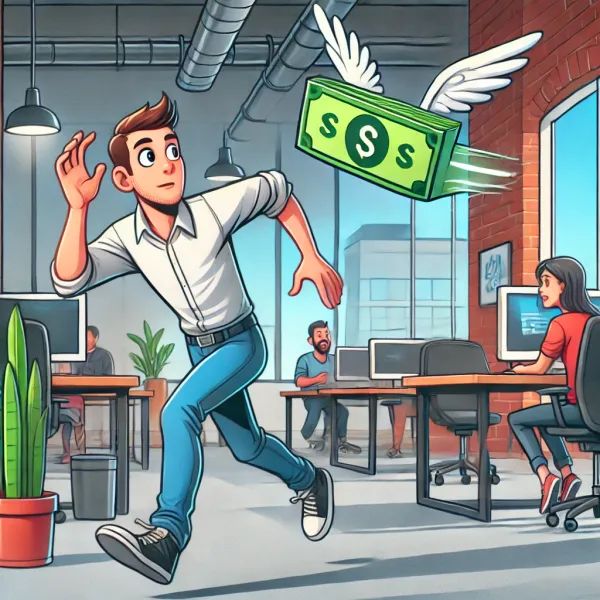Why you should get a cofounder
All the reasons you should find a cofounder for your startup.

This article is the bookend to a pair of articles that are about why you should or shouldn’t get a cofounder. I’m having fun arguing with myself…
You have no idea what you're doing
Startup culture lionizes young entrepreneurs. Every movie about entrepreneurship seems to follow college-age hackers as they drop out of school and then found a Unicorn. However, most research shows that older people are far more likely to be successful as entrepreneurs.
A big piece of this advantage is just that older people have more career experience. They're not spending as much time learning on the job so they're faster, less likely to spend money poorly, and more efficient at getting work done. So, particularly if you're quite young and you really have no idea what you're doing either in business or in the startup world, you'll probably have an easier time figuring it out together with somebody else, particularly if you can find somebody who has some of the skills that you don't have.
You work better with a partner
Knowing yourself is really important. You may just be somebody who works better with a partner. They may help you stay focused, stay on task, and brainstorm. You can hold each other accountable. That's totally fine and if that's the case you shouldn't think about it twice - find yourself a cofounder.
You're applying to Y Combinator
Y Combinator has made it explicitly clear that they prefer cofounders over single founders. Doesn't mean that you'll never get in as a solo founder there are examples, but if you want to get into Y Combinator, best to apply with a cofounder.
You're missing significant skills to get to market
If you're very early on in your startup project and you're missing key skills like software development (or the ability to manage software development) and your product is heavy on these skills you might consider a cofounder as the cheapest current form of labor. Just remember that they're cheap in terms of cash right now, but very expensive in terms of dilution in the long run. So this only makes sense if you're pretty far from market, not if you're already generating revenue or pretty close.
You're far off from funding or revenue
If you're really far off from either funding or revenue you have a long, long road ahead of you. Finding the right cofounder may accelerate your path to market and save you time (and years of your life). Just make sure you find a cofounder who's going to push you and the startup to move fast.
You're lonely
For some people working alone in isolation on something that's hard sounds... terrible. If you're already feeling lonely or the prospect of working as hard as you are for years on your own is utterly depressing, that's a really good sign that dilution be damned you should find a cofounder.
You think it'll be more fun
Startups are fun! Or at least they can be fun. There's nothing wrong with starting your startup because you think it'll be a great time. You may have more fun with a cofounder, and there is nothing wrong with that. Find yourself someone fun to work with
You have someone you really want to work with
Perhaps you and your college roommate have always gotten on well and worked on a few side projects together, and now you finally have a chance to cofound a startup. That's great! Prior relationships and knowing somebody's work already can make the cofounder experience easier. They can also make it harder because your preconceived relationship colors everything you do within your startup, but as long as you take that into account, this is a really fun outcome. Who doesn't want to work with someone who they already know has their back?
You’re bootstrapping on the side
If you're bootstrapping a side business while you're employed full time you may struggle to find the time to work fast enough to get to market. It can make sense to find a cofounder who's in a similar situation. You'll just need to make sure that you're really well aligned on how many hours and what kind of money you might individually pump into the business and who owns what. You'll also want to talk thoughtfully and carefully about when either one of you might become full-time in the business. And what happens if the business can support one of you but not both of you full-time, both in terms of equity and cash.
You don't want to be the CEO
A startup needs a CEO. You cannot fundraise without someone sitting in the CEO's seat. This is just the truth. If you already know you don't want to be CEO for whatever reason you don't want to do the job, you don't want the title, you don't want the attention, none of this is a bad thing but it, but it does mean that you need someone to be CEO and that's not you. Find a cofounder who does want to be CEO.
If you’re not sure, check out my article on the pros and cons of being your statup’s CEO.
You’ve been asked to join a startup
This was my situation! You meet someone who you really want to work with who has a great idea and you decide to join them you've already got a built-in cofounder, congratulations! Nothing wrong with this situation at all, as long as you don't mind being the non CEO cofounder.
A warning
Always (always, always, always) make sure that you have vesting for all cofounders’ shares. You probably already know this, but a 12 month cliff (so no shares vest until you've both been at it a year) followed by monthly vesting for three more years is standard. This protects you against having a cofounder leave early on with so much equity that the business becomes unviable for investment.
Also make sure that intellectual property rights are handled correctly - the company should own any relevant intellectual property that either of you develop. You can look at CooleyGO for example documents to set up an equity plan, stock agreements, and intellectual property agreements.
I'm not your lawyer, your therapist, your advisor, or your accountant. We're just internet friends, and these are just my experiences and personal opinions. Consult professionals for advice before you make any sudden moves in your startup.
You will see the occasional affiliate link. I do earn a commission if you buy the products I recommend. I appreciate you buying through the links if you're going to buy. This is a labor of love for my fellow cofounders, and I do love receiving a few coins to pay hosting costs if you like my work.




